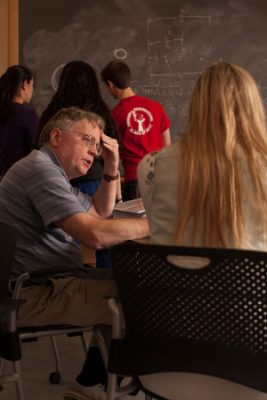New teaching model a ‘game changer’

A "flipped" class, taught by Bert Fulbright, senior lecturer in physics.
December 17, 2014
Hundreds of students have just completed new courses in the College of Arts and Sciences’ Active Learning Initiative (ALI), part of a strategic effort by the college to embrace engaged learning models and emerging technologies. The ALI five-year pilot project is funded by Alex and Laura Hanson, both Class of 1987.
ALI uses a “flipped classroom” approach: Knowledge transfer happens before class, through assigned reading material or videos. Class time is then used for “deliberate practice,” applying the new knowledge via problem-solving and reasoning to give students experience making and testing predictions and solving problems. Studies have shown that the deliberate practice model is the quickest path to expert-level mastery of a given skill set.
“Because the College of Arts and Sciences teaches foundational courses that all undergraduate students throughout the university take, we have the unique opportunity to impact undergraduate education throughout Cornell with this initiative,” says Gretchen Ritter, the Harold Tanner Dean of Arts and Sciences. “We’re harnessing the passion and commitment from both faculty and alumni to institute these initiatives and expand our efforts to other foundational courses throughout the college.”
Physics and biology, the pilot departments for ALI, each converted large course sequences to the new model and reach almost 3,000 students. Jed Sparks, professor of ecology and evolutionary biology and ALI project lead for biology, said the initiative is “not fixing bad or broken classes but ones that are well-received – making something that works well work even better.”
Advanced students in ALI courses benefit from the deeper level at which the courses operate beyond basic knowledge transfer; midrange students have more opportunity to develop expert-level skills through greater exposure to more material; and the least prepared students benefit from improved opportunities to engage the course material, develop and practice skills, and close achievement gaps more quickly.


